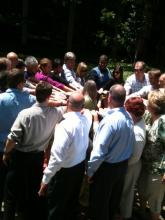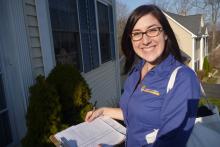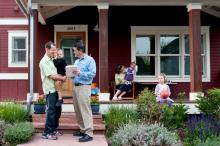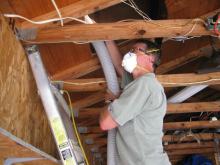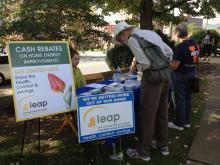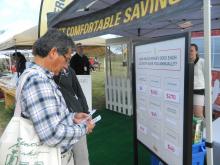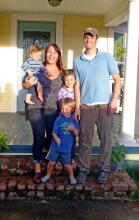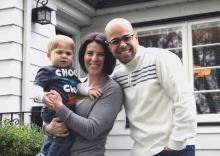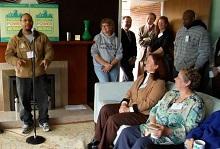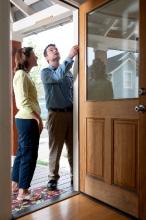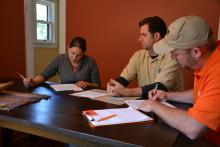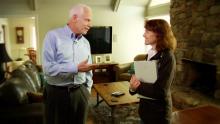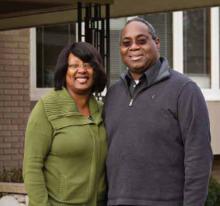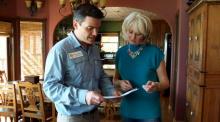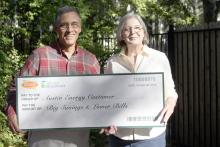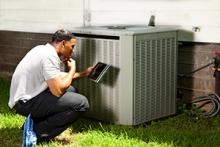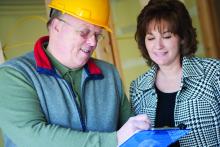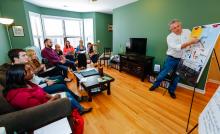In recent years, hundreds of communities have been working to promote home energy upgrades through programs such as the Better Buildings Neighborhood Program, Home Performance with ENERGY STAR®, utility-sponsored programs, and others. Proven Practices include key lessons learned, program examples, videos, and helpful tips from residential energy efficiency programs across the United States. The posts below cover the topics that continue to be the most relevant and often challenging for programs.
Proven Practices
Posted Date
February 8, 2018
To develop strong and lasting partnerships, residential energy efficiency programs and their partners have identified shared goals and ways for partners to enjoy mutual benefits and advance each other’s missions.
Posted Date
December 27, 2017
Successful residential energy efficiency programs find that timely follow-up after an outreach push can help convert leads into customers. After customers receive an energy assessment, contacting them via phone or email can also boost the number of upgrades completed.
Posted Date
November 13, 2017
Successful residential energy efficiency programs strive to set requirements for high-quality home energy upgrades and streamline processes to facilitate contractor participation.
Posted Date
October 10, 2017
Successful residential energy efficiency programs repeat messages often to inform potential participants about program offerings. As marketing gurus note, most people need to be exposed to a message at least three times times and on separate occasions before taking action.
Posted Date
September 5, 2017
Just as no two houses are the same, homeowners have different upgrade needs, time constraints, and budgets. A comprehensive evaluation of more than 140 residential energy efficiency programs across the United States found that successful programs offered participants more than one option for home energy assessments.
Posted Date
July 18, 2017
Because providing new services that require upfront investments in training and equipment adds risk to a contractor’s business, many residential energy efficiency programs looking to increase their contractor base have taken steps to lower or eliminate barriers to entry into the home performance industry.
Posted Date
June 9, 2017
Local financial institutions can be valuable partners to residential energy efficiency programs. They not only can introduce their customers to your program’s services, but also enable customers to pursue larger home energy upgrades by providing financing.
Posted Date
May 5, 2017
Looking to appeal to a broader range of diverse residential energy efficiency customers? Consider offering a select number of program options with different levels of cost and complexity.
Posted Date
April 10, 2017
With all the other things that compete for homeowners’ time and attention, programs that simplify the upgrade process for customers and streamline processes are the ones that get results.
Posted Date
March 13, 2017
Energy upgrades can make homes safer and reduce residents’ health risks. Because energy efficiency programs help improve residents’ quality of life, their missions are consistent with other organizations focused on public health, low-income housing, or local economic development.
Posted Date
February 3, 2017
Everyone likes to be recognized for their achievements; it motivates us to continue working hard. Likewise, contractors appreciate being recognized for their home performance accomplishments.
Posted Date
January 11, 2017
When it comes to making home energy upgrades feasible financially, ensuring that homeowners understand their financing options is important for converting interest into action.
Posted Date
December 12, 2016
Paid advertising is one way to promote residential energy efficiency program offerings, but good public relations that leads to “earned” media stories is even better.
Posted Date
November 9, 2016
Piquing customers’ interest in an energy-efficient home is just the tip of the iceberg when it comes to encouraging upgrades.
Posted Date
October 10, 2016
A comprehensive evaluation of over 140 programs across the United States found that more successful residential energy efficiency programs offered multiple training opportunities to contractors, either by delivering training or engaging with local partners to offer training.
Posted Date
September 12, 2016
One of the hurdles that many homeowners face when considering home energy upgrades is how to pay for them. Contractors, as program partners who work with homeowners face-to-face, are in a unique position to help them address this concern by suggesting financing offered through the program.
Posted Date
August 8, 2016
Residential energy efficiency programs have found their marketing efforts are more successful when they craft their messaging to resonate with specific customer needs.
Posted Date
July 11, 2016
A comprehensive evaluation of more than 40 residential energy efficiency programs across the country found that programs were more successful when they provided customers with lists of pre-approved contractors.
Posted Date
June 8, 2016
Financial incentives—from rebates to lower interest rates—can help residential energy efficiency programs attract customers’ attention.
Posted Date
May 2, 2016
To monitor progress toward program goals, successful residential energy efficiency programs have used a combination of project tracking systems, customer surveys, information from call centers, and feedback from contractors and other partners.
Posted Date
April 1, 2016
Residential energy efficiency programs striving to improve conversion rates from customer interest to completed upgrades have realized that contractors are typically the primary link between customers and their programs.
Posted Date
March 14, 2016
Some residential energy efficiency programs seek to raise credibility with their target audience, so they turn to “social modeling” techniques with satisfied customers.
Posted Date
February 9, 2016
Residential energy efficiency programs across the United States have found that providing homeowners with a single point of contact increases the likelihood of an upgrade being completed and increases customer satisfaction levels.
Posted Date
January 6, 2016
The upfront cost of an energy upgrade can derail homeowners interested in home performance improvements. One program strategy for making projects more affordable is to offer financing; however, complicated loan application and approval processes can cause delays. Streamlining the loan application process is an effective way to remove this process barrier.
Posted Date
November 16, 2015
Successful residential energy efficiency programs use data collection, transfer, and storage systems to effectively implement activities and track program metrics.
Posted Date
October 1, 2015
Financing allows homeowners to pay for energy improvements over time and invest in higher-cost upgrades than they might be able to afford without it.
Posted Date
August 11, 2015
Once home energy upgrades are underway, energy efficiency programs want to avoid call-backs and enhance their reputation. Because the quality of work that affiliated contractors conduct in customers’ homes reflects on the whole program, it’s important to ensure quality work; however, verifying a consistent level of quality can be challenging.
Posted Date
July 21, 2015
Many successful residential energy efficiency programs across the United States have used in-home events to make upgrade benefits visible by showcasing completed projects and actual results. Attending tours of upgraded homes—especially the homes of trusted neighbors and friends—allows potential customers to see and hear firsthand from satisfied customers, talk directly to the contractors who performed the work, and ask questions or sign up with program staff to start the upgrade process.
